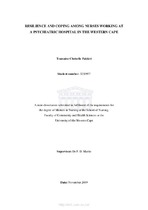| dc.description.abstract | Background: Resilience in nurses plays an important role in caring for mental health care
users admitted to psychiatric hospitals, given that the working environment is stressful. Nurses
are faced with various challenges on a daily basis; therefore, their ability to overcome a
situation, and whether they are able to cope effectively, or develop lasting consequences, could
be beneficial, or detrimental to themselves, or the mental health care users, to whom they
provide care. Although resilience has been studied in various workplace settings, there is a
paucity of literature on resilience among nurses working in psychiatric hospitals, as well as the
coping strategies they employ, to enable them to cope with everyday stressors.
Aim and objectives: The aim of this current study was to investigate resilience and coping
among nurses working at a psychiatric hospital in the Western Cape. The objectives of the
study were to determine the nurses’ ability to bounce back, or recover from stress, to describe
coping strategies used by nurses in the psychiatric hospital, and to determine the association
between resilience and coping strategies of nurses working at a psychiatric hospital in the
Western Cape.
Method: A quantitative, descriptive survey design was used to investigate resilience and
coping among nurses working at a psychiatric hospital in the Western Cape. Convenience
sampling was used to secure a sample of 255 respondents from a total population of 382. The
Brief Resilience Scale (BRS), which is a 6-item Likert scale, and the Brief COPE scale, which
is a 28-item Likert scale, were used to collect data. The Statistical Package for Social Sciences
(SPSS), version 25, was used to analyse the data.
Findings: The findings of this current study revealed that the overall mean score for the
resilience of the respondents was 2.5 (±0.7), out of a possible of 4, which indicates that the
level of resilience of the respondents was normal. The most frequently used coping strategies
were religion and active coping, followed closely by positive reframing and planning. The
coping strategy used least, was substance use. However, humour, denial and behavioural
disengagement revealed significant difference between the groups. There was a significant
correlation between resilience and active coping, denial and venting.
Recommendations: Research studies on resilience and coping of psychiatric nurses in
different contexts should be conducted. In addition, the use of the BRS and Brief COPE scales
should be used as instruments, when conducting studies on psychiatric nurses. | en_US |

